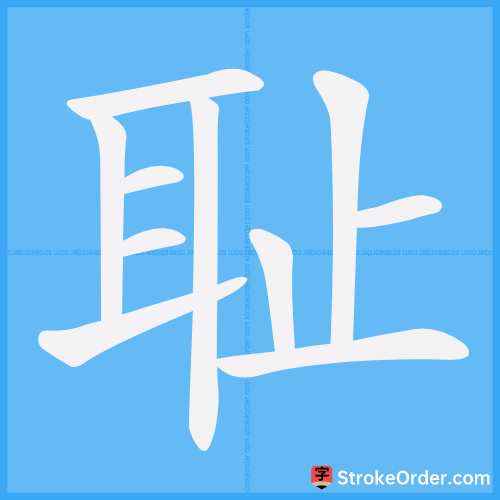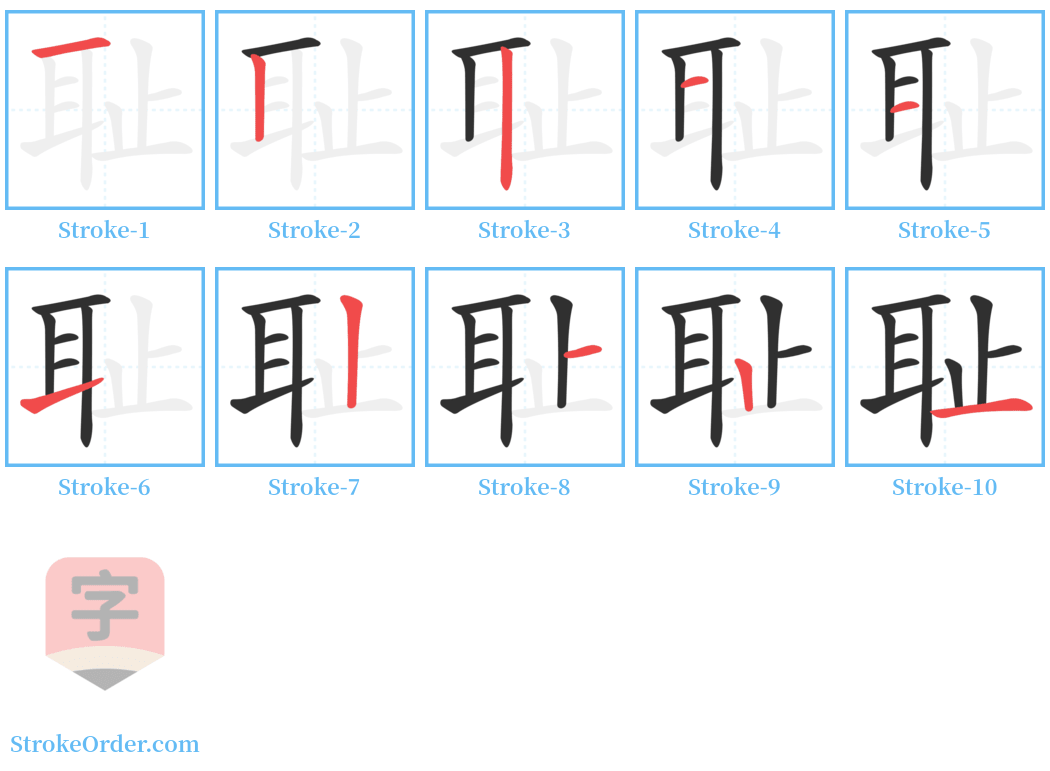耻 Stroke Order
Animated Stroke Order of 耻

Stroke Order Diagrams for 耻

Step-by-Step Handwriting Guide for 耻

Learn to Write Chinese Characters with Video Tutorials
Watch the video of writing the Chinese character "耻", learn the correct stroke order (笔顺) of the character "耻", and master the standard way of writing the character "耻".
Free Printable Handwriting Practice with Stroke Order: 耻
Printable Writing Practice Worksheet of "耻" in Portrait Orientation (Tian Zi Ge)

Printable Writing Practice Worksheet of "耻" in Landscape Orientation (Tian Zi Ge)

Information of 耻
Pinyin
chǐ
Radical
耳
Strokes
10 strokes
Usage
★★★★★
Definition
shame / disgrace
耻 (chǐ)
1. Meaning: Shame, disgrace.
- Example Expressions:
- 羞~: to feel shame.
- 雪~: to cleanse one's shame.
- 奇~大辱: an enormous dishonor.
- ~笑: to be humiliated and laughed at.
- ~骂: to be scolded in a humiliating way.
2. As a noun:
- Basic Meaning: Disgrace, a shameful act.
- Formation: Phonetic-semantic; consists of the heart component (心) and the ear sound (耳).
- Synonyms:
- 同本义: the same basic meaning (inner shame due to damaged reputation) ([En.] disgrace).
- 羞愧 ([En.] shame).
3. Usage:
- Example texts:
- 《说文》: "耻,辱也." (Shame is disgrace.)
- 《谷梁传·襄公二十九年》: "君不使无耻." (The ruler should not allow shamelessness.)
- 《论语》: "行己有耻." (Acting with a sense of shame.)
- 《吕氏春秋·顺民》: "越王苦会稽之耻." (The King of Yue grieves over the disgrace of Kuaiji.)
- 《国语·越语上》: "而患其志行之少耻也." (Concerned about the lack of shame in actions and ambitions.)
4. Example Phrases:
- 无耻: shameless (disregarding shame).
- 羞耻: disgraceful; unsightly.
- 耻心: sense of shame.
5. As a verb:
- Meaning: To humiliate; to insult.
- Synonyms:
- 羞辱; 侮辱 ([En.] humiliate).
- Example texts:
- 《诗·小雅·宾之初筵》: "不醉反耻." (To not be drunken is to feel ashamed.)
- 《论语·公冶长》: "左丘明耻之,丘亦耻之." (Zuo Qiuming felt ashamed of it, and so did Qiu.)
6. Example Phrases:
- 耻怍: to be humiliated.
national humiliation, refers to Japanese incursions into China in the 1930s and 40s, and more especially to Mukden railway incident of 18th September 1931 九一八事變|九一八事变 and subsequent Japanese annexation of Manchuria
not to think it as shameful / not to be ashamed of / not to regard ... as a cause for shame / not to think it shameful to
Input Method for 耻
Pinyin
chi3
Wubi
bhg
Cangjie
sjylm
Zhengma
ceii
Four Corner
11410
Unicode
U+803b
Same Pronunciation Characters